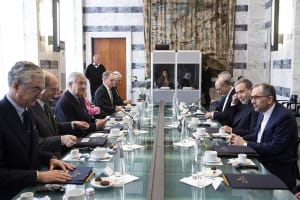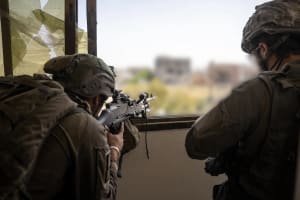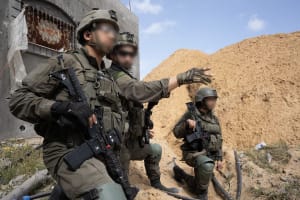Israeli cabinet advocates dividing Syria into cantons as Turkey threatens Intervention – report
Iran calls for stability, territorial integrity and Israeli withdrawal from Syria

Since the Islamist group Hay’at Tahrir al-Sham (HTS) expelled the regime of Bashar al-Assad and assumed control in Syria, its neighbors have watched the developments with increasing concern.
Israel immediately ordered the IDF to seize the former demilitarized zone along the border and capture several strategic positions – most notably, the Syrian peak of Mt. Hermon – while declaring the move to be a temporary precaution.
Since then, Israeli leaders have been discussing how to deal with the new Islamist government, while critically observing the moves of its new patron, Turkey.
According to an Israel Hayom report, the situation in Syria and Turkey's involvement were among the main issues of a recent, limited cabinet meeting chaired by Defense Minister Israel Katz. Another high-level discussion led by Prime Minister Benjamin Netanyahu is scheduled for the coming days.
The first discussion reportedly centered on concerns over the safety of Druze and Kurdish minorities under the new HTS-led government.
Israeli Energy Minister Eli Cohen reportedly advocated for promoting an international conference on Syria, aiming to secure Israel’s border by garnering some international support for Israeli military operations against threats posed by HTS forces.
Cohen also suggested at this conference an initiative to divide Syria into cantons to ensure the security and rights of all ethnic groups in Syria. Israel Hayom did not cite any additional details about this initiative, including what degree of autonomy the cantons would have.
However, the report noted that senior political and security officials have already discussed the idea, with a main concern being that any initiative proposed by Israel is unlikely to be accepted by the other states in the region.
While Israel seems to advocate a weakening of central authority in Syria, Turkey’s President Recep Tayyip Erdoğan reiterated several times in recent weeks his opposition to the break-up of the country.
“We will not consent to the disintegration of Syria or the disruption of its unitary structure under any guise. If we see a risk in this regard, we will take the necessary steps swiftly,” Erdoğan said at a press conference this week.
Turkey has long-standing ties with HTS and is poised to take over the role of the Iranian regime as Syria’s main international supporter.
In a message to the U.S.-backed Kurdish forces battling Turkish proxies in northern Syria, Erdoğan added, “The only fate awaiting those who choose terror and violence is to be buried in the ground with their weapons. I am saying this openly, no power can prevent this.”
“The circle is narrowing for the separatist organization and its extensions in Syria. As the government and the alliance, we will achieve our goal of a terror-free Turkey, one way or another. Of course, we hope this will happen safely. If this road is blocked and dynamited, then we will not hesitate to strike with the iron fist of the state wrapped in velvet gloves,” the President vowed.
Turkey announced it is prepared to support HTS with military aid, training, and reconstruction support, as well as contracts with Turkish firms.
Meanwhile, Syria’s former patrons in Iran and their Iraqi allies are signaling tacit acceptance of the new rulers in Damascus, stressing the need for stability while demanding the end of “foreign interventions,” which statement is probably aimed at both Israel and Turkey.
“Stability in Syria is the key to stability in the region,” stated Iraq’s Prime Minister, Mohammed Shia' al-Sudani, during a visit to Tehran on Wednesday. He called to end foreign interventions and allow the Syrian people to decide their own fate.
“We are ready to work with all parties to achieve stability in Syria, ensuring that all Syrians and various groups participate in shaping the country's future,” al-Sudani said.
Iranian President Masoud Pezeshkian added, “Both countries share common concerns regarding Syria. These include ensuring stability and peace in Syria, preserving its territorial integrity, combating terrorist groups, the necessity of the Zionist regime’s withdrawal from occupied territories, and respecting religious sentiments, particularly concerning Shiite holy sites.”

The All Israel News Staff is a team of journalists in Israel.
You might also like to read this:

















